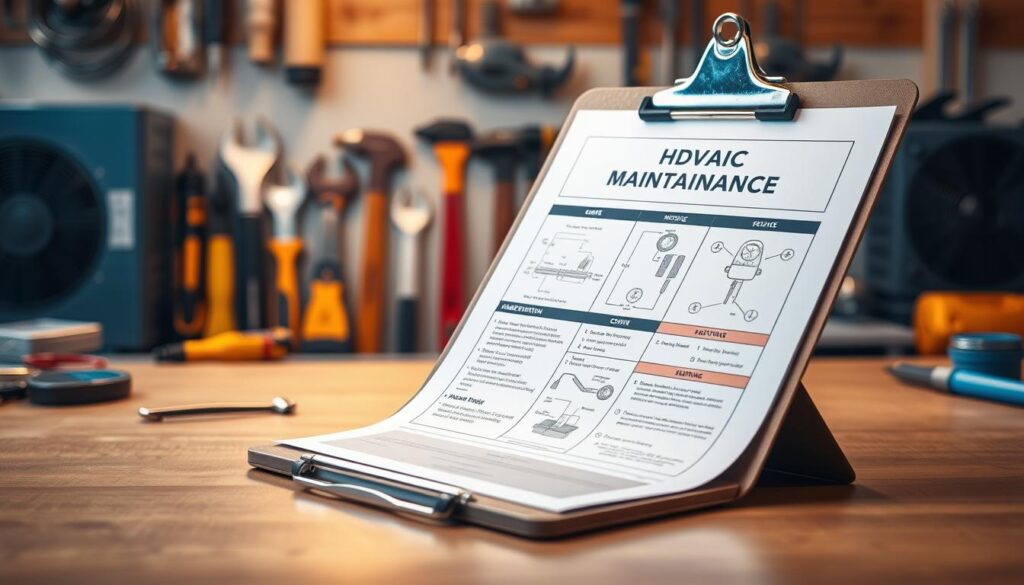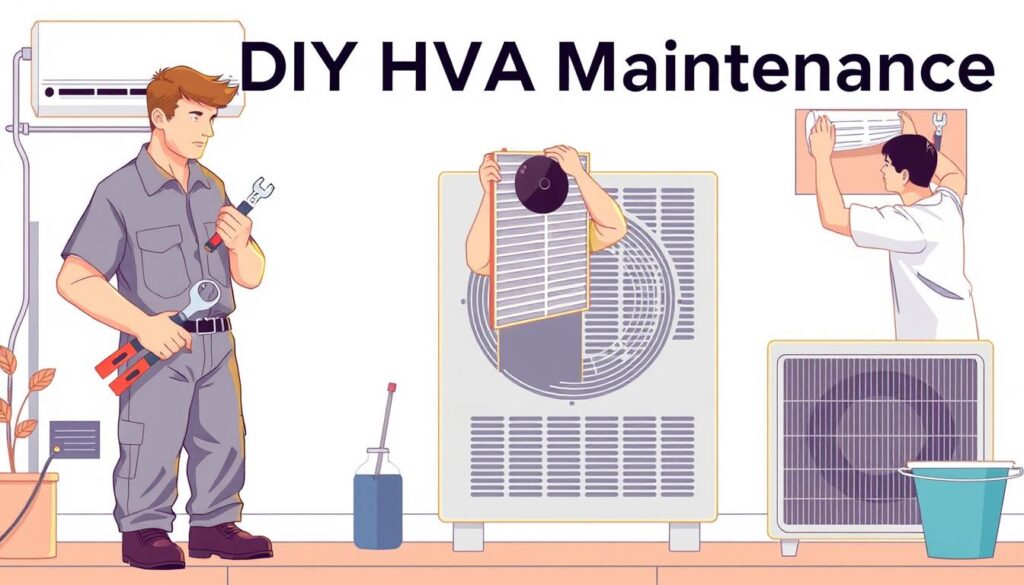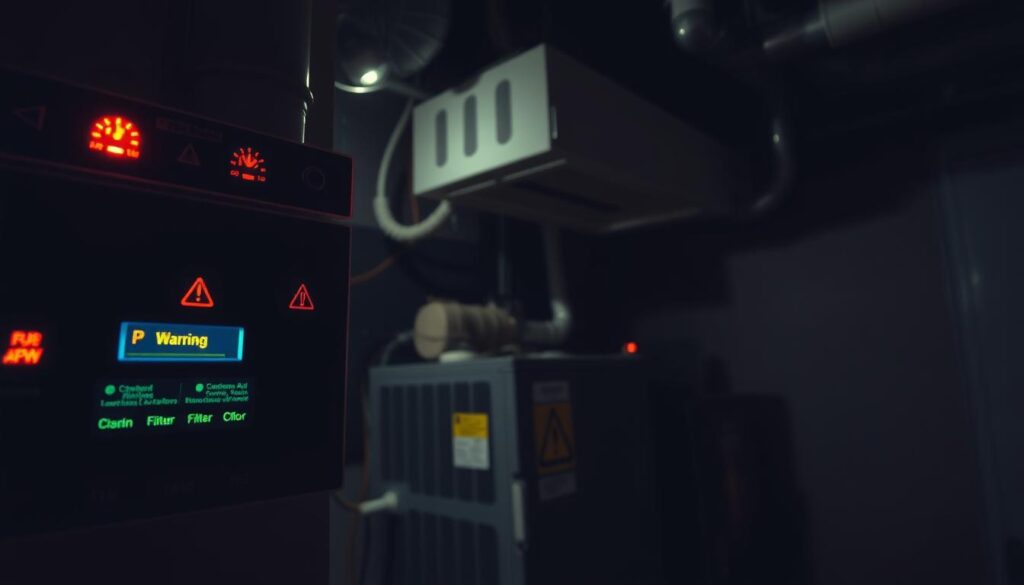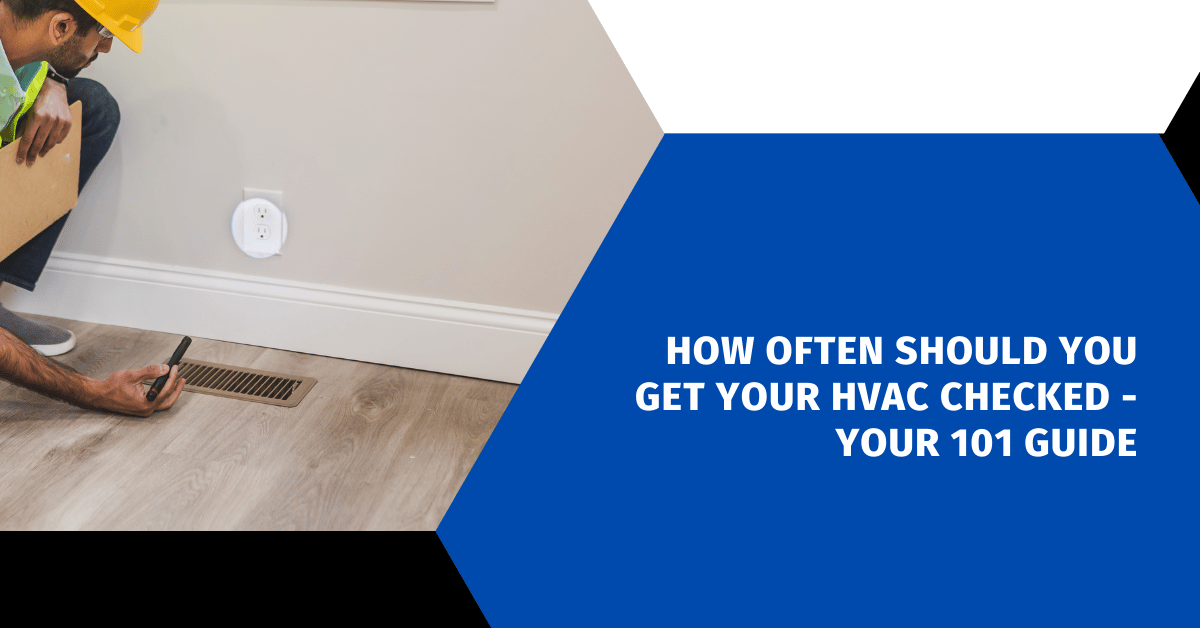Affiliate Disclosure
HVAC Guide Guys is a participant in the Amazon Services LLC Associates Program, an affiliate advertising program designed to provide a means for sites to earn advertising fees by advertising and linking to Amazon.
How Often Should You Get Your HVAC Checked? Ever thought your HVAC system might be costing you money and comfort? Your home’s heating, ventilation, and air conditioning system is a big investment. It needs regular care to keep your home comfy and energy-saving.

Creating a good HVAC maintenance plan is more than just avoiding sudden breakdowns. It’s about keeping your system running well, performing at its best, and keeping your home comfortable all year. Knowing when to get your HVAC checked can save you a lot of time, money, and stress.
Today’s homeowners know that regular maintenance is essential for their HVAC system’s longevity. By learning about routine checks and warning signs, you can safeguard your home’s comfort system.
Key Takeaways
- Regular HVAC maintenance prevents costly emergency repairs
- Professional inspections should occur twice yearly
- DIY maintenance can supplement professional service
- Well-maintained systems improve energy efficiency
- Seasonal changes impact HVAC performance
Table of Contents
Understanding the Importance of Regular HVAC Maintenance
Your HVAC system is key to home comfort. It works hard all year to keep your space cozy. Regular maintenance is not just a tip—it’s essential for your system’s best performance, energy use, and long life.
Regular HVAC checks can stop sudden breakdowns and save you money. An annual checkup spots issues early, avoiding big problems later.
The Role of Preventive Maintenance
Preventive maintenance protects your HVAC system. Regular inspections help:
- Catch small problems before they grow
- Keep your system running smoothly
- Make your equipment last longer
- Keep your warranty valid
Benefits of Regular System Checks
Professional HVAC inspections bring many benefits:
- Improved Air Quality: Clean filters and systems cut down on dust and allergens
- Energy Efficiency: A well-kept system uses less energy
- Consistent Comfort: Reliable performance through all seasons
Cost Savings Through Maintenance
Regular hvac checks save you money. They can cut energy costs by up to 15% and avoid pricey emergency fixes.
Prevention is always more affordable than replacement.
Explore Our HVAC Shop
Looking for top-rated HVAC tools, parts, and accessories? Visit our shop and find the perfect solution for your needs.
Visit the ShopHow Often Should You Get Your HVAC Checked
Keeping your home’s HVAC system in top shape is key. Knowing when to get it checked can save you money and make it last longer. Experts say a good maintenance plan should fit your needs.
Your HVAC system needs regular check-ups to stay healthy. A good maintenance plan includes:
- Bi-annual professional inspections (spring and fall)
- Quarterly air filter replacements
- Annual complete system check
Several things can change how often you need maintenance, such as:
- How old your system is
- Your local weather
- How much you use it
- What the maker says
| Maintenance Interval | Recommended Actions |
|---|---|
| Every 3 Months | Replace/clean air filters |
| Twice a Year | Professional HVAC system inspection |
| Annually | Comprehensive system evaluation |
Pro tip: Keep a maintenance log to track your HVAC system’s health and schedule timely check-ups.
“Regular maintenance is the key to a long-lasting, efficient HVAC system.” – HVAC Industry Experts
Essential Components of an HVAC Inspection
Understanding the key parts of an HVAC inspection is key for keeping your system running well. A full hvac equipment check is more than just looking at it. It involves a detailed look at important parts.
Professional technicians check several important areas during a full system check:
- Air filtration systems
- Electrical connections
- Coil and fin condition
- Overall system performance
Air Filter Inspection and Replacement
Your HVAC system’s air filter is key for clean air and efficiency. Dirty filters can cut airflow by up to 15%. This makes your system work harder and use more energy.
Coil and Fin Maintenance
Coils are vital for heat transfer in your HVAC system. Dust and dirt can make them less effective. This can lower performance and raise energy use.
| Component | Inspection Focus | Potential Issues |
|---|---|---|
| Indoor Evaporator Coil | Dirt and debris buildup | Reduced heat absorption |
| Outdoor Condenser Coil | External contamination | Decreased heat dissipation |
| Fins | Straightness and condition | Airflow restrictions |
Electrical Component Check
Electrical connections are the heart of your HVAC unit. Bad connections can cause system failures, higher energy use, and safety risks.
Regular inspections can prevent up to 95% of unexpected HVAC system breakdowns.
Explore Our HVAC Shop
Looking for top-rated HVAC tools, parts, and accessories? Visit our shop and find the perfect solution for your needs.
Visit the ShopDIY HVAC Maintenance Tasks You Can Perform
Keeping your HVAC system in top shape doesn’t need a pro all the time. With some basic knowledge and simple tools, you can do key maintenance tasks. These help protect your investment and boost system performance.

Regular maintenance can save you from expensive repairs and make your HVAC last longer. Here are important DIY tasks for your hvac annual checkup:
- Change Air Filters Regularly
Swap out your air filters every 1-3 months. Dirty filters cut down airflow and make your system work harder. This increases energy use.
- Clean Air Vents and Registers
Use a vacuum with a brush to clean dust and debris from vents. This improves air quality and keeps airflow efficient.
- Inspect Outdoor Condenser Unit
Clear leaves, grass, and debris around the unit. Keep at least 2 feet of space for good ventilation and system performance.
- Check Thermostat Settings
Make sure your thermostat works right and is set for energy efficiency.
While these tasks are doable for many homeowners, know your limits. If you face complex issues or are unsure, it’s wise to call an HVAC pro. This prevents damage to your system.
Professional HVAC Services vs. DIY Maintenance
Choosing between DIY and professional HVAC maintenance can be hard. Some tasks are easy for DIY fans, but others need a pro’s touch. Knowing the difference can save you money, time, and keep you safe.
When to Call a Professional
Your HVAC maintenance plan isn’t just about regular checks. Some jobs need a pro’s help. Here are times when you should call a professional:
- Complex electrical system diagnostics
- Refrigerant handling and recharging
- Internal component repairs
- Comprehensive system performance evaluations
Tasks Best Left to Experts
Some HVAC tasks are better for certified techs. They have the skills and tools for tough system problems.
- Electrical Repairs: High-voltage parts are very dangerous
- Refrigerant Management: You need a special license for this
- Complex System Diagnostics: This is more than basic upkeep
Cost Comparison Analysis
DIY might seem cheaper, but pros can save you money in the long run. Getting expert maintenance can lower your HVAC repair costs.
Professional help keeps your HVAC in top shape and saves you money.
Explore Our HVAC Shop
Looking for top-rated HVAC tools, parts, and accessories? Visit our shop and find the perfect solution for your needs.
Visit the ShopSigns Your HVAC System Needs Immediate Attention

Your HVAC system sends out warning signs. Catching these early can save you money and keep your home comfy. During a detailed hvac system checkup, experts can spot problems before they get worse.
- Unusual Noises: Sounds like banging, squealing, or grinding mean serious issues
- Inconsistent Temperatures: If rooms have very different temperatures, it’s a sign of a problem
- Weak Airflow: If air isn’t moving well, it might mean blocked ducts or a failing compressor
- Strange Odors: Musty smells could mean mold, while burning smells might point to electrical problems
During hvac unit servicing, pros can quickly find out what’s wrong. A sudden increase in your energy bills often means your system is working too hard. This is a clear sign it’s time for a thorough check.
“Preventive maintenance is always cheaper than emergency repairs” – HVAC Industry Experts
Ignoring these signs can cause your system to fail completely. This might leave you without heat or cool air when you need it most. Regular check-ups can save you a lot of money and keep your home comfortable.
Seasonal HVAC Maintenance Guidelines
Keeping your HVAC system in top shape all year round is key. Regular maintenance stops sudden breakdowns and keeps your system running well in any weather.
Good maintenance means changing your approach with the seasons. Your system needs special care in hot summers and cold winters.
Spring and Summer Preparation
- Clean outdoor condensing unit thoroughly
- Replace air filters
- Check refrigerant levels
- Inspect cooling coils for dust and debris
- Test thermostat functionality
Fall and Winter Readiness
- Inspect heating elements
- Seal air leaks around windows and doors
- Check attic and wall insulation
- Lubricate moving parts
- Test carbon monoxide detectors
Monthly Maintenance Checklist
Make a regular schedule to keep your HVAC system in great shape:
- Check air filters monthly
- Clean return air vents
- Ensure clear space around outdoor units
- Listen for unusual sounds
- Monitor energy consumption
Pro tip: Think about getting professional maintenance twice a year. It helps catch problems early and keeps your system efficient.
Energy Efficiency and Cost Savings Through Regular Maintenance
Your HVAC system is key to your home’s energy use. Regular checks can cut your energy bills and make your system work better. The U.S. Department of Energy says you can save up to 15% on energy costs with proper care.
Choosing the right time for hvac tune-ups is important for efficiency. Here are some ways regular maintenance can save you money:
- Clean air filters cut energy use by 5-15%
- Proper lubrication lowers system stress
- Calibrated thermostats help control temperature better
- Early detection stops costly breakdowns
Regular maintenance is more than just avoiding repairs. It’s a smart move that makes your HVAC last longer and saves money in the long run. Experts can spot issues early, keeping your system running smoothly.
A well-maintained HVAC system can save hundreds of dollars a year on energy and repairs.
By keeping up with inspections and maintenance, you’re not just saving cash. You’re also making your home more comfortable and energy-efficient.
Explore Our HVAC Shop
Looking for top-rated HVAC tools, parts, and accessories? Visit our shop and find the perfect solution for your needs.
Visit the ShopCommon HVAC Problems and Their Solutions
Knowing about common HVAC issues can save you time, money, and stress. Spotting problems early can avoid expensive fixes and keep your system running smoothly.
During your HVAC unit servicing, several common problems should be checked:
- Unusual Noises: Different sounds point to different issues
- Banging: Could mean a compressor or loose part issue
- Buzzing: Might be an electrical or motor problem
- Hissing: Often means a refrigerant or duct leak
- Temperature Inconsistencies: Uneven heating or cooling could be due to:
- Blocked air vents
- Dirty air filters
- Ductwork problems
Regular maintenance can stop many of these problems. Simple tasks like changing air filters and cleaning around your outdoor unit can greatly improve your system’s performance.
“An ounce of prevention is worth a pound of cure” – this is very true for HVAC systems!
If DIY fixes don’t work, it’s time to call a professional HVAC technician. Some issues need special tools and knowledge.
Don’t forget, regular maintenance during your hvac annual checkup can catch problems before they cost a lot to fix.
Conclusion
Creating a solid HVAC maintenance plan is key to keeping your home comfy and efficient. Knowing when to get your HVAC checked can save you from expensive repairs and make your system last longer. Regular upkeep is more than just fixing issues; it’s about keeping your investment in top shape.
Your HVAC system needs both personal care and expert help. While you can do some maintenance yourself, getting professionals to check it twice a year is essential. Keeping records of your maintenance can also boost your home’s value if you decide to sell.
Being proactive with your HVAC maintenance means combining DIY efforts with professional advice. Start by following the tips from this guide—change filters monthly, get professional checks in spring and fall, and watch how your system works. These actions will keep your home cozy, cut down on energy bills, and prevent surprise repair costs.
In the end, knowing how to maintain your HVAC system lets you enjoy a more comfortable and efficient home. Your dedication to regular care will reward you with better performance, lower energy bills, and peace of mind for years to come.

